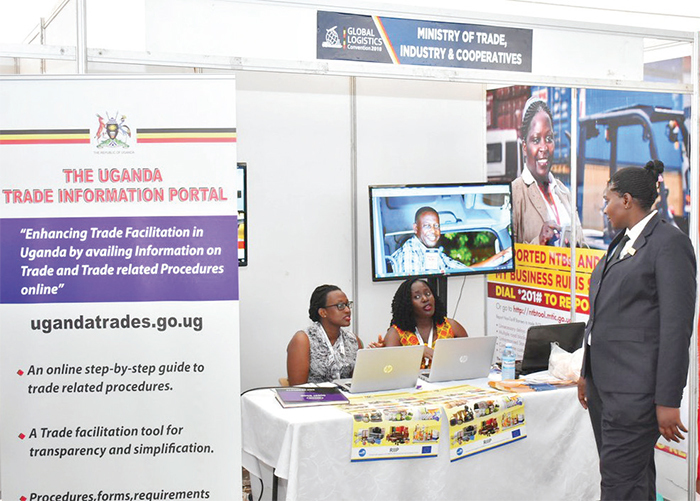Uganda trade portal launched
The online system whose development started with a signing of a Memorandum of Understanding between the Ministry of Trade, Industry and Cooperatives
The signing of the memorandum of understanding between trade ministry and TradeMark East Africa to develop the trade information portal
Yoram Atuhamize, the managing director of Jora Shoes Company, is one of the entrepreneurs who attended the trade sector review meeting in Kampala recently. During the meeting, Atuhamize learnt of the trade information portal, an information-sharing platform.
Prior to the meeting, Atuhamize, whose company makes between 30 and 60 pairs of shoes daily, was looking for ways to explore other markets, but he did not have any clue of where to start from.
"I was looking for a way through which I can export my products, but now I have found the answer on the trade information portal," he said.
Atuhamize describes learning about the portal as better than being given cash handouts. "Giving me information that is helpful to my business is better than giving me sh100m," he says.
Like Atuhamize, there are several other people producing commodities that they would like to export to other countries but have no clue where to start from and the procedures involved. This has compromised expansion of their businesses.
However, the woes of producers and traders in Atuhamize's situation could soon be history following the development of the Trade Information Portal by the Ministry of Trade, Industry and Co-operatives.
About the trade portal
The portal is an electronic platform which enables all interested parties to access information regarding procedures, documentation, fees and other related charges with respect to exportation, importation and transit of goods.
 Trade Ministry officials explain how the portal works during a recent exhibition in Kampala
Trade Ministry officials explain how the portal works during a recent exhibition in Kampala
Trade minister Amelia Kyambadde describes the portal as an online one-stop place for all trade information premised on a World Trade Organisation (WTO)'s Trade Facilitation Agreement (TFA) signed in Bali, Indonesia in 2013. Uganda ratified the agreement last year.
The TFA agreement requires member states to publish their export, import and goods' transit procedures, as well as the responsible people's contacts, online within available resources, establishing contact points to respond to enquiries.
The online system whose development started with a signing of a Memorandum of Understanding between the Ministry of Trade, Industry and Cooperatives and development partners, TradeMark East Africa (TMEA) in September 2017, was commissioned recently at Kampala Serena Hotel and is officially operational.
The portal, which has been developed with a grant of $500,000 (about sh1.875b) from United States Agency for International Development (USAID) through TMEA, can be accessed at. http:// ugandatrades.go.ug. The portal provides timely and accurate information to all interested stakeholders on procedures, documentation, fees, charges for exportation, importation and transit of goods.
It also provides the related addresses and contact details of the relevant officials. It also seeks to bring clarity and simplification measures in order to reduce the cost, time and administrative complexity in the export, import and transit of goods, particularly to the micro, small and medium enterprises.
 The trade information portal complements other trade facilitation initiatives like the One Stop Border Post
The trade information portal complements other trade facilitation initiatives like the One Stop Border Post
This is aimed at improving the doing of business environment with the ultimate goal of attracting investment in the country.
A user-friendly portal
Richard Okot Okello, the assistant commissioner for external trade, explained that the trade portal is designed from the user point of view, through collection of information from different agencies mandated to clear imports and exports.
He said when making regulations, institutions are often thinking about themselves, but not the people or traders who go through the many steps the regulation creates. "When a trader goes to an institution such as a ministry responsible for business, the institution tends to think about itself, forgetting that the trader has been to other institutions," Okello said. "Putting these steps together gives these institutions a feel of what a trader goes through as they seek to export or import commodities," he added.
Okello said they are looking at reducing the steps that a trader goes through when exporting or importing, adding that previously the steps were isolated in different agencies.